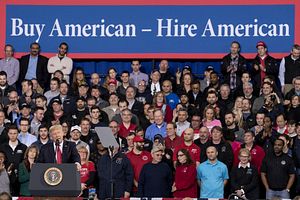U.S. President Donald Trump’s administration has begun acting on its tough trade rhetoric. This month, the U.S. Trade Representative released a report outlining what it believes are China’s numerous violations of World Trade Organization (WTO) policies, including “the Chinese government’s prolific use of industrial policies that promote, guide and support domestic industries.” This is a direct reference to the “Made in China 2025” policies that China hopes will transform its economy. The administration also placed new 30 percent tariffs on imported Chinese solar panels. Finally, wind turbine producer Sinovel was recently convicted of stealing trade secrets from American Superconductor Corp. While the case was initially brought by the Obama administration, the conviction coincides with increased congressional scrutiny of Chinese business partnerships with U.S. corporations.
None of this is to say that a trade war is imminent. Economists and trade officials in the United States have discussed the distorting effects of China’s trade and industrial policies before, and past administrations have slapped tariffs on other goods from China. Indeed, heads of global banks believe that a trade war would be so catastrophic to both sides that a trade version of “mutually assured destruction” will deter such an outcome. Moreover, many believe that because the United States needs Chinese cooperation to check North Korea, the Trump administration cannot take too hard a stance. Of course, both of these beliefs rest on policymakers in both Beijing and Washington seeing mutual gain from their cooperation on North Korea and being able to appease their increasingly nationalistic bases.
Yet a trade war is unnecessary to cause economic disruption. Senior Chinese officials have suggested stopping or slowing the country’s buying of U.S. government debt. Again, while this is a proposal the Chinese have considered before, the timing of the suggestion is ominous: many of Trump’s policy plans, including the recent tax overhaul and planned infrastructure projects require an increase in the national debt.
The Trump administration has more upcoming deadlines to act on Chinese trade policies, such as imposing restrictions on steel and aluminum imports or taking action on Chinese intellectual property theft. The administration may claim that these actions are necessary to protect American national security, introducing security dynamics into trade conversations. Some believe and hope that even if the United States takes a more confrontational approach to trade that China will avoid responding in kind, simply because it has more to lose.
However, this belief rests on the assumption that China also believes it would lose a trade war. Yet not everyone shares this belief. In fact, China has a number of ways to retaliate should the United States increase trade restrictions, such as restricting imports of U.S. agricultural products or automobiles. For now, however, Chinese officials appear to be pursuing a cautious course. It maintains that trade cooperation is the only way forward and that Washington’s trade protectionism will hurt it as well. China may pursue recourse through the WTO. Yet even if the WTO rules in favor of China, the Trump administration may simply ignore it, leading China to take unilateral measures.
China’s practice of taking heavy state measures to favor its own industries is well known, and the United States is right to call out these practices and seek restitution. However, the unilateral nature of Washington’s actions coupled with the creeping influence of national security concerns makes its recent moves against China disconcerting. If China believes that it would lose a trade war, it might protest America’s actions but do little else, in which case this will be another example of the United States falling behind the global order. Yet if China believes that it could win, or that it must retaliate to preserve domestic and international standing, then the Trump administration’s punitive measures may be precipitate a global economic crisis.
Zachary Torrey is an analyst focusing on Asia-Pacific politics and economics. He holds an MSc from the London School of Economics.
































